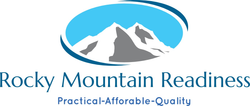For all the things we do at Rocky Mountain Readiness, we are primarily an emergency preparedness company. We focus on items and training that provide our customers with the means to mitigate the impacts of a crisis on their families and while on the job. Food, water, shelter are the very basic things you must cover to get through most emergencies, but there are other things that are critical such as being your own first responder and being responsible for your own security. This focus makes September's National Preparedness Month one of the most important to us and, we think, should be for everyone.
Why is it important to you? It is because just as sure as tax day will roll around each April, each and every one of us will be faced with a crisis/emergency that we are either prepared for or not. The consequences of not being ready can be catastrophic. Each of us are responsible for our own preparedness as individuals or as family members. You may extend that into your business and organizations you may belong to, but the planning and execution of those plans is up to us. How well we accomplish the task can mean the difference between people we care about getting through something out of our ordinary daily circumstances fairly well, or maybe suffering when they didn't have to.
It's important for us to define what we mean by a crisis/emergency because many think of only major disasters like earthquakes or hurricanes as the normalcy bias, the feeling that things are OK now, so things will be OK an hour from now is very strong. An emergency can occur at anytime, anywhere, and impact anyone. And to be frank, we are all going to be directly involved in, at some time, an emergency and how we come out of it depends on the planning we do beforehand.
Like what? Well, it can be a huge event like a hurricane, a massive storm or regional prolonged power outage, but more than likely it will be a family member or someone we care about becoming seriously injured where it is up to us in that specific moment to care for them before help can arrive. In those minutes, the outcome is in our hands. It can be a job loss and with it the loss of income resulting in a significant financial burden of the family that could bring a certain degree of suffering for the family as choices of what to spend limited funds on can make even buying food a challenge. Perhaps your furnace goes out or you are faced with major vehicle repairs that aren't in the budget. Those moments are for those it is happening to is as much as a crisis as any storm or an emergency that normally come to many people's minds.
So how do you prepare? There are countless numbers of things that could happen and we can't possibly prepare for everything and that is exactly true. Fortunately, we don't have to plan for everything, but many people don't even start because the task of preparing becomes overwhelming as they see the task as getting ready for everything. They then suffer from paralysis from analysis and, even as they see the need to prepare, no planning is done or those that are made are not effective.
So, how do you plan effectively? We start by covering the basics because if the those considerations are covered, the likelihood of you getting through most everything from a spouse who falls down the stairs to hurricane evacuations are greatly increased. The basics being food, shelter, water, being able to treat at least basic medical emergencies, and knowing we are responsible for our own security in a crisis. Look at the big things that are likely in your area and then drill down to things in your personal circumstances that can change and the impacts those changes would have on you. Look at how you would provide for the basics. Break the task down into manageable parts and do it as your circumstances allow and know that while it's a critical task, it doesn't all have to be done all at once, but make goals in your planning and try to meet them. Family and personal plans should be looked at no longer than annually as circumstances can change. Follow the cycle: plan, execute, reevaluate, and adjust those plans are needed.
Remember, the most important tool in planning for and getting through emergencies for your family, business, or organization is your own attitude towards the task. That attitude is more important than the money you can spend or the gear that you buy. That attitude will determine if your plans are practical and executable or too scattered and unworkable. Cover the basics. Look at what is likely to occur and take steps to ensure you and your family are covered as best as you possibly can be prepared.
What’s the most important step in preparedness planning? That’s easy. Start. Do it today as a crisis won't wait on you.
Don
If you have any questions, please let us know.


Comments (0)